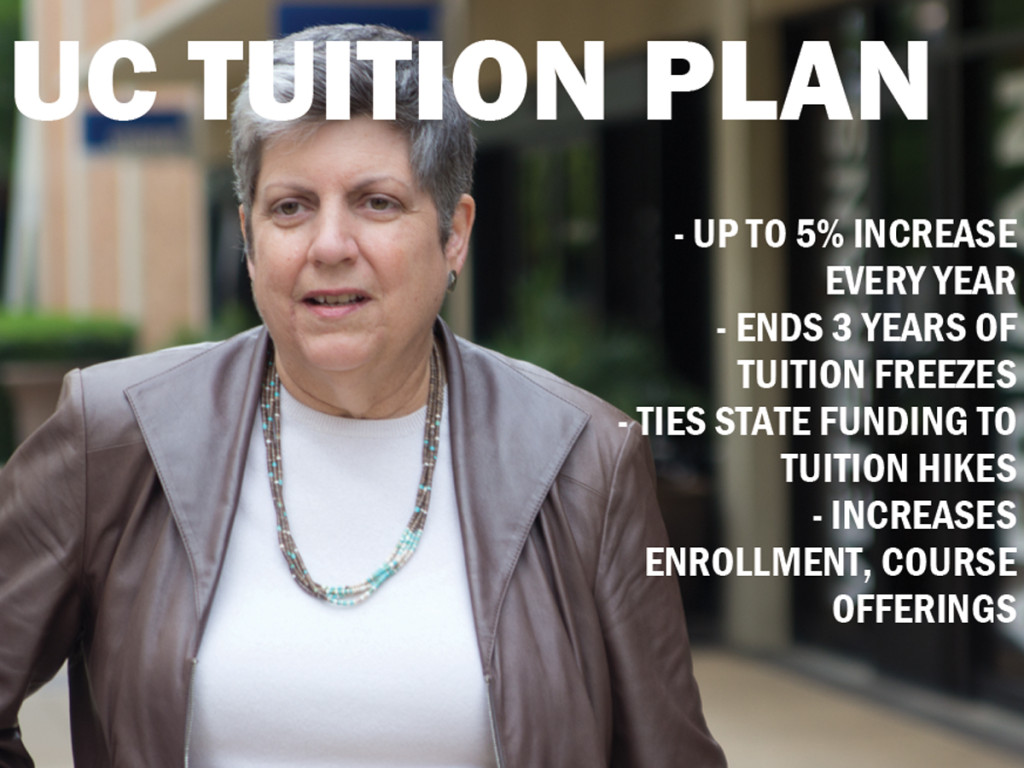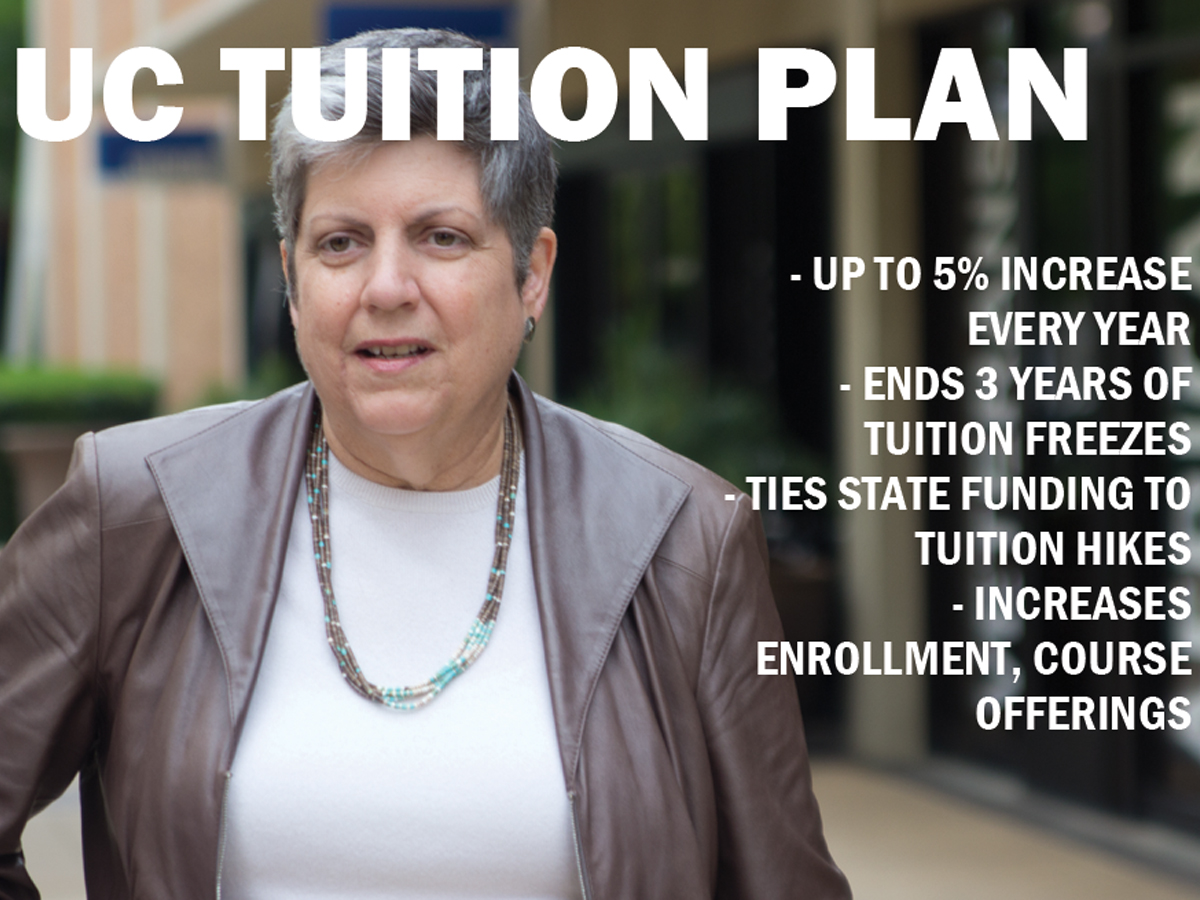
UC President Janet Napolitano has announced that the UC regents will vote on a long-term financial stability plan, which includes the possibility of tuition increases of up to 5 percent, at the next regents meeting. Despite support from the administrations of all 10 UCs, the decision was met with opposition from UC students and politicians in the state capital.
Napolitano explained that the move was intended to “avoid the massive spikes of the past” by giving Californians and potential UC applicants certainty about the potential cost of tuition. “It will pencil in the 5 percent increase. It will be the ceiling,” Napolitano said.
If approved by the regents, the plan will be in place for five years, during which the UC could choose to raise tuition by up to 5 percent per year. The plan also allows for no change in tuition if the state maintains its current funding commitment of a 4 percent increase every year. Under the proposal, annual tuition for an in-state student could remain at $13,300 per year for the next five years. Conversely, the worst-case scenario could result in an increase of more than $2,000 over the span of five years, which would result in an over $16,000 per year tuition rate in the 2019-2020 academic year.
The plan comes after three years of consecutive tuition freezes. However, Napolitano explained that due to an increasing campus population and intended future development, freezes were no longer feasible for the UC. “You can’t have a tuition freeze indefinitely at this level of funding from the state,” she said. According to Napolitano, the funds would be distributed to individual UCs to be used as needed, with overall goals including increasing enrollment by 5,000 over five years and expanding the UC’s financial aid programs.
However, UC Student Association President Jefferson Kuoch-Seng denies that the proposal would produce financial stability for students. “UCSA views the plan proposed by UCOP as one that does not prioritize students, but rather holds them hostage for the future of their education. Instead of using students as political pawns, the UC and Regents should consider partnering with students on a meaningful level to advocate to the state for more funding,” Kuoch-Seng said in a statement. UCSA has started a petition against the proposal, arguing that the UC should roll back tuition increases, which Napolitano has dismissed.
The proposal is at odds with an agreement struck two years ago between Gov. Jerry Brown and the UC. Brown’s 2013-2014 budget includes 4 percent increases in funding for the UC through the 2014-2015 fiscal year, and 5 percent increases until the 2016-2017 fiscal year. Last year, that amounted to an additional $125.1 million. The budget states that, “This funding should obviate the need for UC to increase student tuition and fees.” However, UC Chief Financial Officer Nathan Brostrom denied that any agreement had taken place.
The plan already faces stiff opposition from many in Sacramento. Assembly Speaker Toni Atkins and Lieutenant Governor Gavin Newsom, both of whom are also ex officio members of the UC Board of Regents, have expressed skepticism of the plan. Atkins released a statement in which she announced she would oppose the proposal, saying, “It is disturbing to see students used as leverage in budget negotiations.”
The proposal has also attracted criticism for coming only a month and a half after the UC raised the salaries of four of its chancellors. AFSCME Local 3299 President Kathryn Lydbarger, whose union represents many UC employees and student workers, stated in a press release that “If UC wants to regain the trust of California lawmakers, the starting point should be to stop squandering millions of public dollars on oversized executive compensation and outsourcing contracts.”
The UC insists that it has been cutting bureaucracy. Brostrom says that the UC has decreased its personnel, including a 28 percent decrease in faculty and a 24 percent decrease in general staff from 2008-2013. “You can’t cut your way to excellence,” Napolitano said.
Gov. Brown has expressed opposition to further tuition increases, but it is unclear what, if any, action he will pursue; one possibility is that he pushes to draw down state funding for the UC. Gov. Brown has noted that the passage of Proposition 30, which increased the sales tax by a quarter-cent and raised taxes on incomes greater than $250,000, should preclude the need to raise tuition. He has previously vetoed increases in funding for the UC.
However, UC officials say that the funds from Proposition 30 are not being used by the state in the way the UC envisioned. Brostrom called the increase in funding disproportionate, saying that while California’s general fund received an 8.8 percent increase in funding, the UC only saw a 4 percent increase in funding. “In all candor, we thought we should have had more money from Prop 30,” Brostrom stated.
Brostrom emphasized that despite the potential tuition increase, the UC was still one of the most affordable public institutions in the country. “We are a third of the sticker price. On average we get $4,000 from every student,” Brostrom said, adding that only 30 percent of students pay full tuition.
The proposal comes at a time of substantial change for the UC. From 2008 to 2013, the amount of state funds the UC received declined from $3.3 billion to just over $3 billion. In the same timespan, tuition increased by $5 billion, and enrollment has increased by 12,000 students in just four years, from over 226,000 in 2008 to more than 238,000 in 2012.
The regents will vote on the plan when they meet at UC San Francisco from Nov. 19-20.








